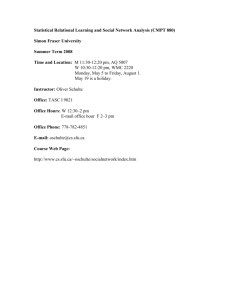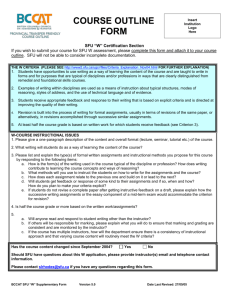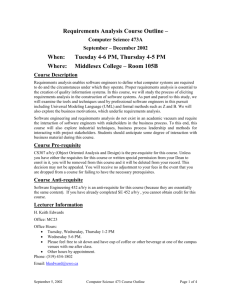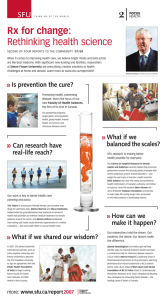Spring 2014 Prof. Hira time
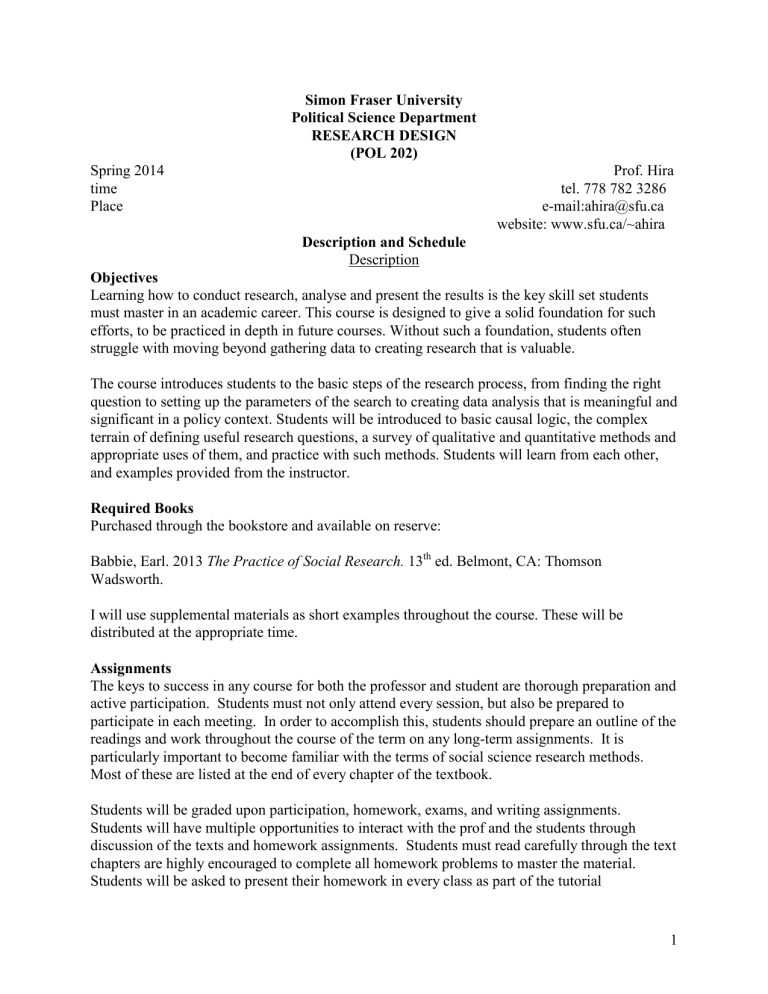
Simon Fraser University
Political Science Department
RESEARCH DESIGN
(POL 202)
Spring 2014 time
Place
Prof. Hira
tel. 778 782 3286 e-mail:ahira@sfu.ca website: www.sfu.ca/~ahira
Description and Schedule
Description
Objectives
Learning how to conduct research, analyse and present the results is the key skill set students must master in an academic career. This course is designed to give a solid foundation for such efforts, to be practiced in depth in future courses. Without such a foundation, students often struggle with moving beyond gathering data to creating research that is valuable.
The course introduces students to the basic steps of the research process, from finding the right question to setting up the parameters of the search to creating data analysis that is meaningful and significant in a policy context. Students will be introduced to basic causal logic, the complex terrain of defining useful research questions, a survey of qualitative and quantitative methods and appropriate uses of them, and practice with such methods. Students will learn from each other, and examples provided from the instructor.
Required Books
Purchased through the bookstore and available on reserve:
Babbie, Earl. 2013 The Practice of Social Research.
13 th
ed. Belmont, CA: Thomson
Wadsworth.
I will use supplemental materials as short examples throughout the course. These will be distributed at the appropriate time.
Assignments
The keys to success in any course for both the professor and student are thorough preparation and active participation. Students must not only attend every session, but also be prepared to participate in each meeting. In order to accomplish this, students should prepare an outline of the readings and work throughout the course of the term on any long-term assignments. It is particularly important to become familiar with the terms of social science research methods.
Most of these are listed at the end of every chapter of the textbook.
Students will be graded upon participation, homework, exams, and writing assignments.
Students will have multiple opportunities to interact with the prof and the students through discussion of the texts and homework assignments. Students must read carefully through the text chapters are highly encouraged to complete all homework problems to master the material.
Students will be asked to present their homework in every class as part of the tutorial
1
discussions. The culmination of the course will be students presenting their own research design.
Grading
The assignments will be graded proportionally as follows:
Participation and attendance
Weekly homework assignments
Quizzes
Mid-term
7-10 page research design memo
Final Exam
10%
10%
10%
20%
20%
30%
Assignments are due promptly at the beginning of class.
Office Hours
My office is in AQ6048. I am generally around M-F 9-3, but it’s best to send an e-mail beforehand. I do not mind students dropping in without an appointment unless the issue requires significant time. I will gather a voluntary contact list for this purpose early in the class.
Schedule
The schedule is planned by weeks. Readings should be done prior to each class. Assignments will be due at the beginning of the class.
I. Introduction to Course (Sept 4)
-About the Professor, the students, and the course
-How social science research can contribute to knowledge and society if properly designed.
Examples of Common Challenges with Student Research
Managing Long-term Projects
-Time Management
-Segmentation
-Peer Review + Editing Management
Choosing a Topic- a) Scope b) Feasibility c) Research aims
SFU student resources: Learning Commons, Library
II. Defining an Appropriate Research Question (Sept 18)
Science vs. Social Science vs. Postmodern Approaches to Research Design a) inductive vs. deductive approaches b) problem of control/bias/dynamism
Ethics and Plagiarism Considerations
The Role of Each Element of a Good Research Paper a) Objective b) Literature Review Synopsis c) Conceptual Framework
2
d) Methods e) Recommendation/Conclusion
Readings: Babbie, c.s1, “Human Inquiry and Science,” c.2, “Paradigms, Theory, and Social
Research,” pp. 43-59, c.3, “The Ethics and Politics of Social Research,”
Homework due: Take a look at the proposed research questions on p.28. Choose 2 and explore whether these questions are feasible and reasonable in scope.
III. Research Question and Research Design Concepts(Sept 25)
-Identifying an appropriate question
“The Hook”
Output parameters
Common sense tests: 5 min test; q vs. conclusion; tests for bias
Deliverables
Importance/Implications
-Links to Other Elements
-Units of Analysis
-Element of Time
-Causality vs. Correlation
Readings : Babbie, c.4, “Research Design”
Homework due: Babbie, Qs 1&2
IV. Causality, Logic- Examples from PS (Sept 11)
-Causal Approaches in PS
-Proximate vs. Indirect Causality
-Small N vs Large N
-Concept Specification and Measurement
-Common Logical Errors
Readings:
-John Gerring, “The Conundrum of the Case Study,” c.1, 1-6 in Case Study Research: Principles and Practices , NY: Cambridge U., available through SFU lib. Catalogue, on-line;
-Arndt Wonka, 2007. “Concept Specification in Political Science” c.3, 41-61 in Thomas
Gschwend and Frank Schimmelfennig, Research Design in Political Science: How to Practice
What They Teach , NY: palgrave macmillan JA 86 R38 2007
-W. Phillips Shivley, 2013. “Causal Thinking and Design of Research,” c. 6, 73-95 in The Craft of Political Research , Toronto: Pearson, JA 71 S45 2013
Homework due: Identify Research Topic for Design Project. Write about your topic in a short memo discussing the importance, relevance and feasibility of the question, the possible outcomes and value of the project, and whether an inductive or deductive approach seems best.
V. Conducting Research (Oct 2)
How to conduct research for books and articles
Explaining Academic Discourse- paradigms, theories, and hypotheses
Differences in types of academic materials: edited volumes, single author books, and journal articles
3
Differences in types of Journals
When and How to Use Internet & Policy Sources
Librarian-guided session
-Boolean Logic
-Database searches for PS
-Citation Formats
Homework due: Conduct research for your topic, identifying the key paradigms for your question.
VI. Literature Review (Oct 9)
Concentric circles approach
Identifying the Appropriate Network of Authors a) tracking techniques b) identifying schools of thought c) differentiating b/t concepts d) identifying the reasoning behind particular methods
Reading Analytically, not just Factually
Identifying Interesting Questions a) what does the literature review (not) tell us? b) what can be done to move it forward?
Preparing an Annotated Bibliography
Readings: Babbie, c.17, “Reading and Writing Social Research,”
Homework due: Prepare for the mid-term.
VII. Mid-term (Oct 16)
VIII. Conceptualization, Operationalization and Measurement (Oct 23)
Review of mid-term
Conceptual Framework a) Basic design elements- variable types; Independent vs. Dependent Variables b) Using Theories c) Conceptualization a.
Testing causal analysis- time/space/comparability/correlation issues b.
Key issues, actors, and relationships d) Case Selection- a.
How many cases? b.
Which cases? e) Creating a conceptual map f) Creating Hypotheses- Type I & Type II errors
Linking concepts to data through Variables
Definitional vs. Relational vs. Intensity Approaches
Intro. to Measurement Issues- validity and reliability; experimental design
Secondary vs. Primary Data
-Defining Appropriate Units
4
-Validity and Reliablity
Readings: Babbie, c.5, “Conceptualization, Operationalization, and Measurement,” and c. 8,
“Experiments”
Homework due : c.5, Q.2; Annotated Bibliography for Research Topic
IX. Qualitative Research Methods (Oct 30)
-Case Study and Comparative Methods
-Interviews
-Comparative Case Studies
-Political Relationship Analysis
-Content Analysis
Readings: Babbie, c.10, “Qualitative Field Research,” and c.11 “Unobtrusive Research”
Homework due: Write a memo on the key hypotheses and concepts for your research topic.
X. Sampling and Survey Research (Nov 6)
Logic of Sampling
Populations and Samples
Sampling Designs
Survey Designs
Coding
Sources of Survey Bias, Misinterpretation, “Margin of Error”
Pilot Testing
Readings: Babbie, c.7, “The Logic of Sampling” and c.9, “Survey Research”
Homework due: c.7, q.1
XI. Using Statistics Within a Research Design (Nov 13)
Types of quantitative data
Embedding data into a larger analysis
Appropriate Interpretations of statistics, (mis)use of regression
Basic descriptive statistics (builds on 201) example applications
Advanced techniques- intro to appropriate use of different types of analyses
Readings: Babbie, c.14, “Quantitative Data Analysis,” and c.16 “Statistical Analysis”
Homework due: Prepare a memo on what are the appropriate methods for examining your topic question, hypotheses and concepts. Where will you get the data for your analysis and how will you process it?
XII. Interpreting and Presenting Findings(Nov 20)
-Triangulation
-Logical and Formatting Presentation
-Editing Techniques
-Academic Standards for Assertions, Language, and Logic
-Becoming an Expert in Particular Methods (See Sage RM Online through Lib databases).
Readings:
Martyn Denscombe, 2003. Appendix 3, “Triangulation,” 346-51 in
The good research guide: for small-scale research projects . Buckingham: Open U. Press, available on-line through
5
the SFU library catalogue
-SSRC Research Proposal guide; Schmitter, “The Ideal Proposal;” APSA sample proposals, http://www.apsanet.org/content_9224.cfm
; other examples will be sent
XIII. Final Exam Preparation (Nov. 27)
Homework due: Final report due. Include data instruments and pilot test cases.
Final Exam, place, time tbd
6
AN IMPORTANT REMINDER:
Plagiarism involves using another author’s words without attribution or otherwise presenting another person’s work as one’s own. It is a fraudulent and serious academic offence that will result in a severe academic penalty. Also, close paraphrasing of another author’s work & self-plagiarism, including submitting the same, or substantively the same, work for academic evaluation more than once, are unacceptable practices that will result in a severe academic penalty.
The university policies on academic honesty are available at: http://www.sfu.ca/policies/gazette/student.html
The Department of Political Science’s interpretation of this policy can be found at: http://www.sfu.ca/content/dam/sfu/politics/undergraduate%20docs/PLAGIARISM%20Policy%2
0-%20%20Pol%20Dept.%20Jan.pdf
, and is available in hard copy format outside our General
Office. All students are responsible for familiarising themselves with these policies.
A helpful SFU Library tutorial on plagiarism is at http://www.lib.sfu.ca/researchhelp/tutorials/interactive/plagiarism/tutorial/introduction.htm
The DOs and DON’Ts of AVOIDING PLAGIARISM
Do not :
submit an entire paper or part(s) of a paper or papers that has been written or researched by any other person(s);
submit a paper as an assignment that has been bought from another person or from a ‘paper mill’ or essay service;
submit a paper or other written assignment that has been submitted at another time or for a different course by yourself or any other student or former student;
submit material that has been downloaded from a website, without acknowledging (using appropriate citation style) that you have done so;
take someone else’s idea(s) and represent it/them as your own;
copy any text verbatim, or with only slight variation from the original text, without using quotation marks and documenting the source with proper citation style;
do not closely paraphrase another’s material; either paraphrase completely in your own words, or cite as a direct quotation using quotation marks (in either case, give full credit and details regarding authorship and location of the original material);
Do :
learn how to cite material properly (there are many good guides on this, including the departmental one);
use a recognized citation style (eg. APA, MLA, Chicago), according to instructions given by the course instructor, and be consistent in the use of the style throughout any single piece of written work;
carefully read and make sure you understand the university’s policy on academic honesty;
ask the instructor of this course or other faculty members if you have any questions about plagiarism.
7
